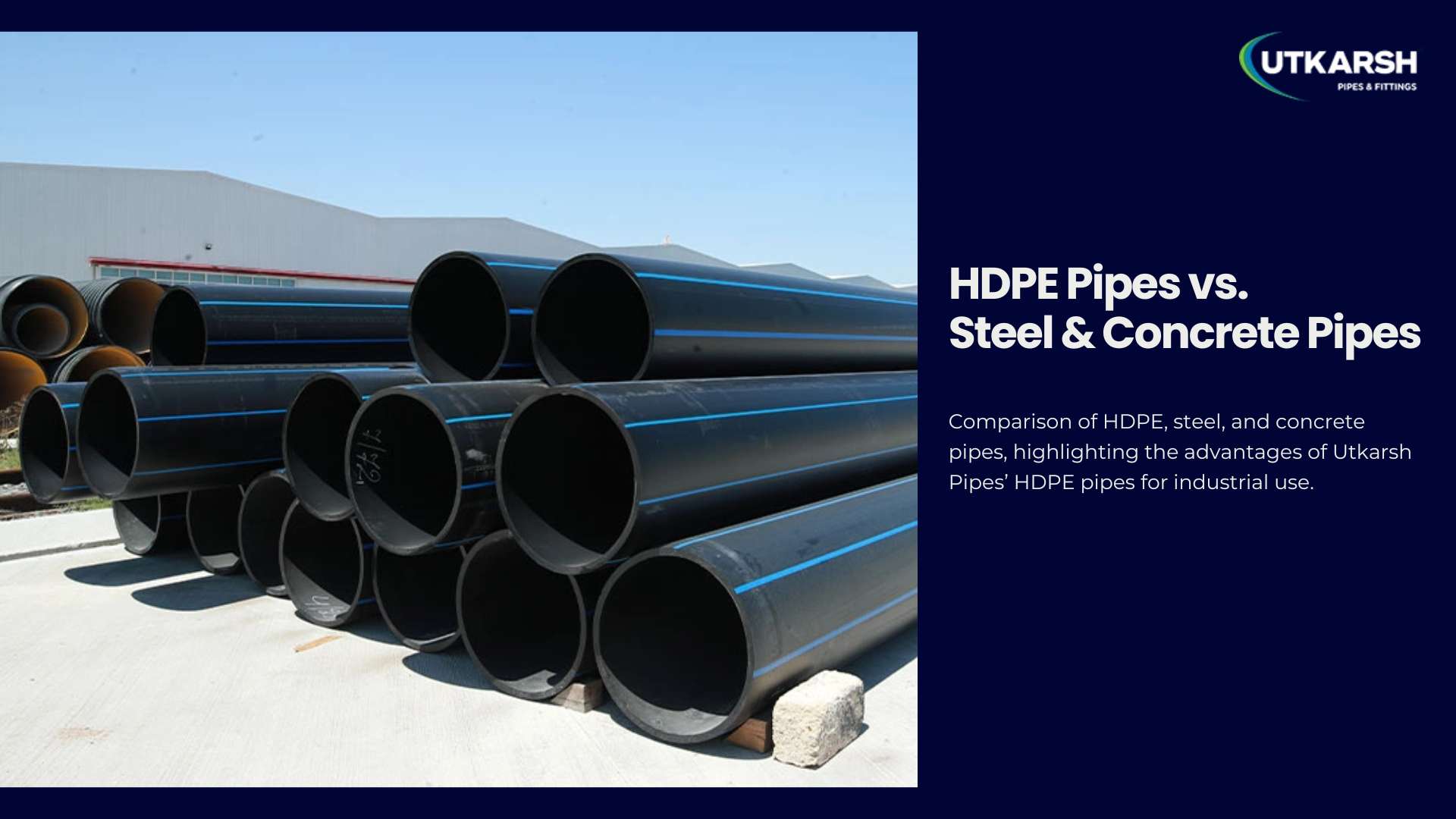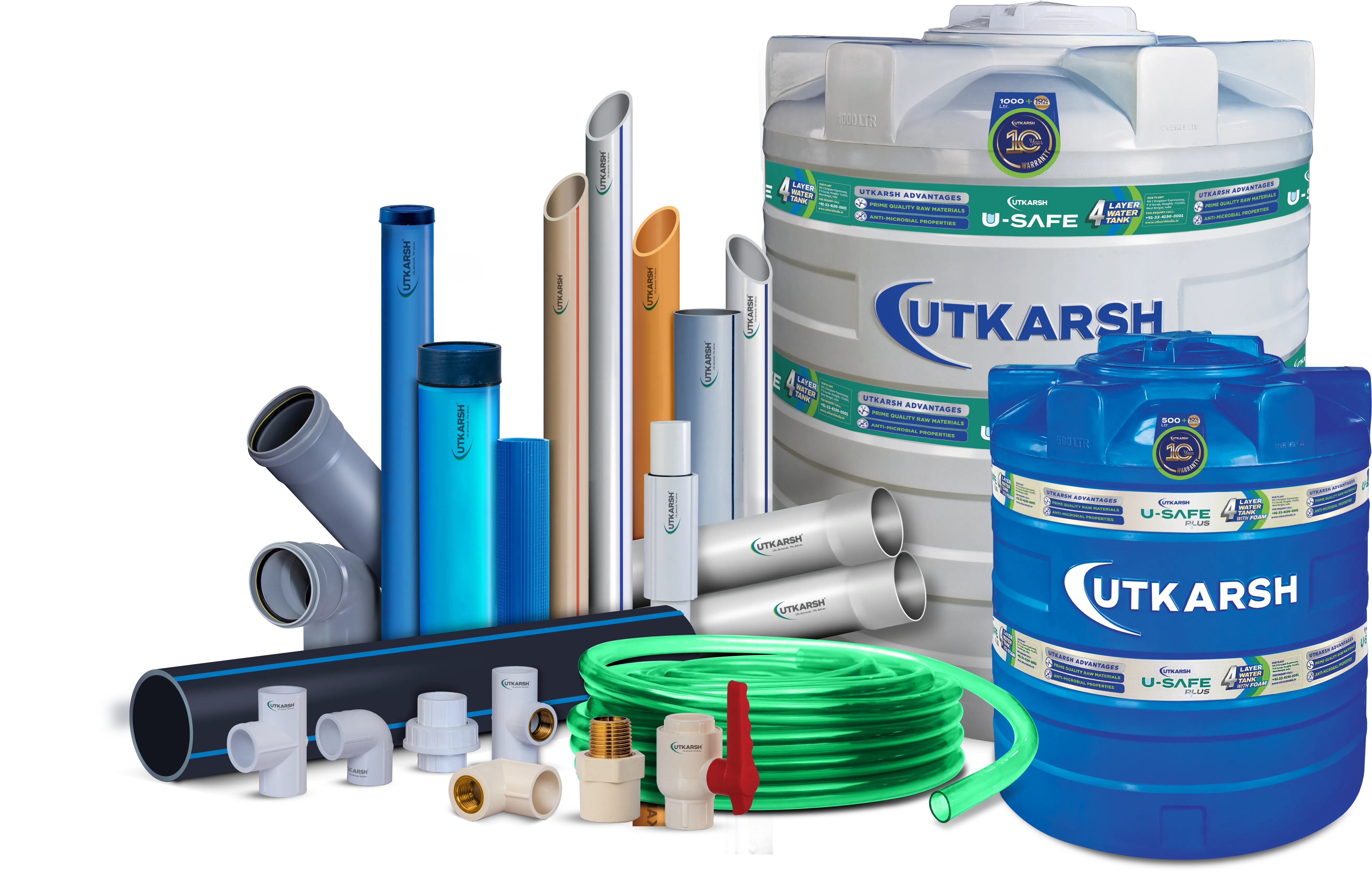Comparing HDPE Pipes with Steel and Concrete Pipes for Industrial Use

In industrial applications, selecting the right piping system is crucial for efficiency, longevity, and cost-effectiveness. HDPE pipes & fittings are increasingly becoming the industry standard, emerging as a preferred choice over traditional steel and concrete pipes.
This blog explores the key advantages of HDPE piping solutions and explains why they are the ideal choice for demanding industrial environments.
What are HDPE Pipes?
HDPE (High-Density Polyethylene) pipes are made from a thermoplastic polymer known for its exceptional strength-to-density ratio. This material is produced through a process that yields a highly durable and flexible pipe, suitable for a wide range of industrial applications. These pipes are widely used in industries such as water supply, sewage, gas distribution, chemical transport, and mining due to their superior durability, chemical resistance, and flexibility.
Utkarsh Pipes provides high-quality HDPE pipes that cater to various industrial applications, ensuring long-lasting performance and reliability.
HDPE Pipes vs. Steel and Concrete Pipes: A Detailed Comparison
| HDPE Pipes | Steel Pipes | Concrete Pipes | |
| Durability | Highly durable, resistant to corrosion, and chemical exposure | Prone to rust and corrosion, requires protective coatings | Susceptible to cracking and structural degradation |
| Flexibility | High flexibility, can withstand ground movements | Rigid, requires extensive joints | Low flexibility, prone to breaking under pressure |
| Installation | Lightweight, easy to transport and install | Heavy, requires more labor and machinery | Labor-intensive and time-consuming |
| Maintenance | Low maintenance, no need for coatings or linings | Requires frequent maintenance and anti-corrosion treatments | Prone to leaks and structural weaknesses |
| Lifespan | 50+ years | 20-30 years (with proper maintenance) | 30-50 years but prone to early wear |
| Cost-effectiveness | Lower overall cost, fewer repairs needed | High initial and maintenance costs | Expensive due to material and labor costs |
Advantages of Utkarsh Pipes’ HDPE Pipes for Industrial Use
1. Corrosion and Chemical Resistance
Unlike steel pipes, which are vulnerable to rust, and concrete pipes, which degrade over time, Utkarsh Pipes' HDPE pipes are highly resistant to a wide range of chemicals, moisture, and corrosion. This makes them ideal for transporting aggressive fluids in industrial settings, including acids, alkalis, and solvents.
2. Lightweight and Easy Installation
HDPE pipes from Utkarsh Pipes are significantly lighter than steel and concrete alternatives, reducing transportation and installation costs. Their flexibility allows them to be installed without excessive jointing, further lowering labor and equipment requirements. Heat fusion joining reduces the need for heavy equipment.
3. Leak-Free Joints
One of the biggest issues with traditional steel and concrete pipes is joint leakage. Utkarsh Pipes’ HDPE pipes & fittings use heat fusion technology, ensuring seamless, leak-free connections that enhance efficiency and reduce water or fluid loss.
4. High Impact and Pressure Resistance
Utkarsh Pipes' HDPE pipes can withstand high-pressure conditions without cracking or breaking. Their flexibility allows them to absorb external stress, making them highly reliable in industrial environments where pressure fluctuations are common.
5. Longevity and Cost Savings
With a lifespan exceeding 50 years, Utkarsh Pipes’ HDPE pipes offer a long-term, cost-effective solution. Reduced maintenance and repair expenses make them a smart investment for industrial applications.
Types of HDPE Fittings and their Uses
HDPE fittings are essential for creating robust and leak-free piping systems. Some common types include:
- Couplers: Connecting two pipes of the same diameter.
- Elbows: Changing the direction of the pipe.
- Tees: Creating a branch connection.
- Reducers: Connecting pipes of different diameters.
- Flanges: Connecting pipes to valves or other equipment.
These fittings, when joined using heat fusion, provide a continuous and reliable piping network.
Why Choose Utkarsh Pipes’ HDPE Pipes?
Utkarsh Pipes is a leading manufacturer of HDPE pipes & fittings, offering top-quality products that meet international standards. Their HDPE pipes are designed for superior performance, ensuring durability, efficiency, and cost savings for industrial use. With a commitment to innovation and excellence, Utkarsh Pipes’ HDPE pipes provide unmatched reliability in various industrial applications.
Applications in Specific Industries:
- Mining: HDPE pipes are used for slurry transport, dewatering, and tailings management due to their abrasion and chemical resistance.
- Oil and Gas: They are used for gas distribution, water transport, and chemical pipelines due to their corrosion resistance and durability.
- Water and Wastewater: HDPE pipes are vital for potable water supply, sewage systems, and industrial wastewater management.
Explore Utkarsh Pipes' range of HDPE pipes & fittings here: Utkarsh HDPE Pipes.
Conclusion
When comparing HDPE pipes with steel and concrete pipes, it is clear that Utkarsh Pipes’ HDPE pipes offer superior durability, flexibility, cost-effectiveness, and long-term reliability. For industries looking for a robust and maintenance-free piping solution, HDPE pipes & fittings from Utkarsh Pipes are the perfect choice.
Invest in high-quality HDPE pipes today for a more efficient and sustainable industrial piping system. Visit Utkarsh Pipes’ HDPE Pipes to learn more.












